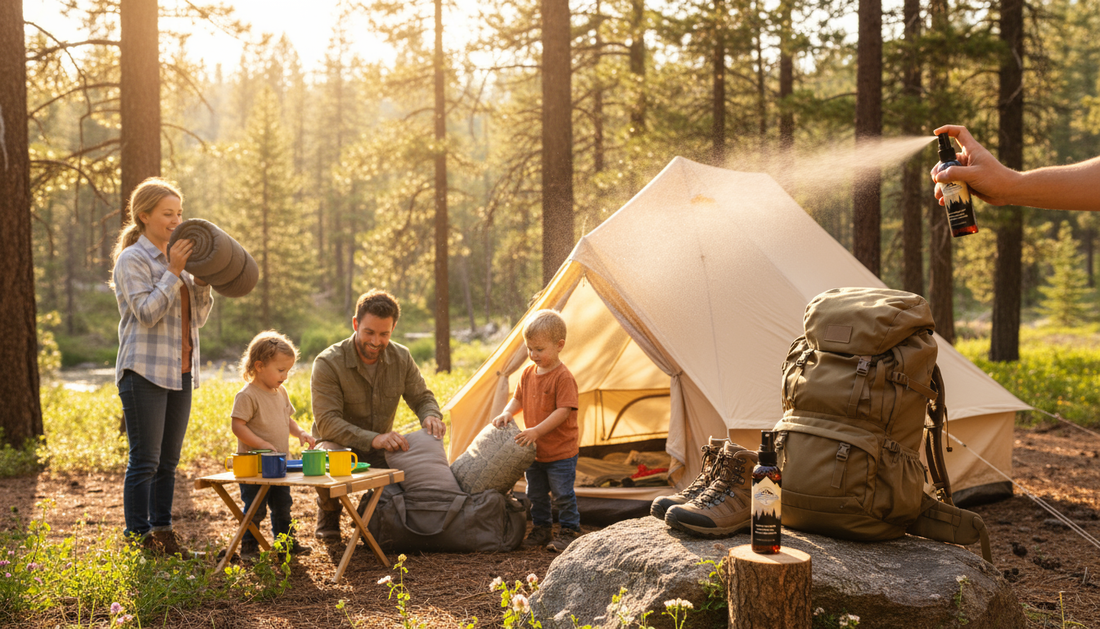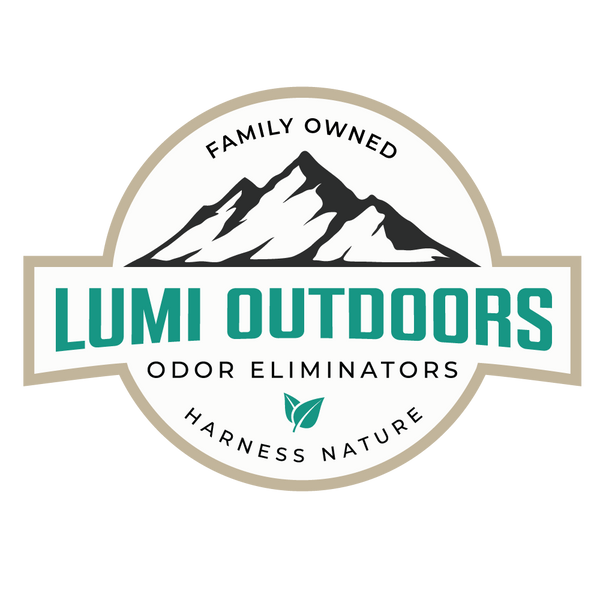
Keep Camping Gear Fresh: Odor Elimination Guide
Share
Hey there, fellow adventurer! I've spent countless weekends in the great outdoors, from backpacking through misty forests to cozy family campfires under the stars. But let's be real—nothing kills the vibe faster than that musty, sweaty smell wafting from your tent or boots after a long day on the trail. If you've ever unpacked your gear at home only to wrinkle your nose, you're not alone. As someone who's dealt with her fair share of stinky sleeping bags and funky footwear, I get it. The good news? You can totally conquer those camping odors and keep your setup smelling fresh for every trip.
Today, I'm sharing everything I've learned about preventing and tackling those pesky smells. We'll cover why they happen, simple daily habits to stop them in their tracks, and deep-clean methods that actually work. Stick with me, and your next outing will feel as refreshing as that first breath of pine-scented air.
Key Takeaways
- Prevention is key: Air out gear right after use and store it dry to avoid 90% of odor issues.
- Natural solutions rule: Skip harsh chemicals—essential oil sprays neutralize smells without the fake fragrance hangover.
- Quick fixes save trips: A spritz of targeted deodorizer can revive boots or tents mid-adventure.
- Why Do Camping Odors Happen?
- Preventing Odors Before They Start
- How to Eliminate Existing Odors
- Gear-Specific Odor-Fighting Tips
- Expert's Toolkit: Recommended Resources
- Frequently Asked Questions
Why Do Camping Odors Happen?
Picture this: You're finally setting up camp after hiking miles with a pack on your back. Sweat soaks through your clothes, mud cakes your boots, and that damp tent from last night's rain hasn't fully dried. Before you know it, bacteria and mildew throw a party in your gear, creating those sour, earthy smells no one wants to deal with. It's not just gross—it's a sign your stuff isn't getting the care it needs.
At the heart of it, odors come from moisture meeting organic matter. Your sleeping bag traps body sweat and skin cells, while tents hold onto rain and dirt. Boots? They're a breeding ground for foot bacteria after trudging through wet trails. And don't get me started on backpacks stuffed with damp socks. Without proper airflow, those elements ferment, turning fresh adventure vibes into something straight out of a locker room.
Have you noticed how some smells linger no matter how much you air things out? That's because certain materials, like nylon in tents or leather in boots, hold onto odors like a sponge. Understanding this helps you stay one step ahead. Trust me, after one too many whiffs of my old tent, I started treating my gear like a picky houseplant—lots of sun and space to breathe.
Common Culprits in the Wild
Let's break it down. Sweat and body oils are the biggest offenders in clothing and sleeping gear. Then there's environmental moisture from dew, rain, or even humid air, which feeds mold in tents. For footwear, it's all about bacterial buildup from enclosed, warm spaces. Even cooking smells from campfire meals can seep into fabrics if you're not careful.
One time, on a rainy trip to the Smokies, I ignored the damp sleeping pad and woke up to a smell that made coffee taste sour. Lesson learned: Odors aren't inevitable; they're preventable with a little know-how.
Preventing Odors Before They Start
Why wait for the stink to set in? Building good habits right from the get-go keeps your gear fresh longer. Think of it as giving your stuff a spa day after every outing—instead of letting smells crash the party.

First things first: dry everything thoroughly. The moment you break camp, unpack and hang items in a well-ventilated spot. Sunlight is your best friend here; UV rays naturally kill bacteria. I always spread my tent out on the driveway for a few hours—it's like hitting reset before storage.
Storage matters too. Avoid cramming wet or dirty gear into bags; that'll trap moisture and kickstart decomposition. Use breathable cotton sacks for clothes and keep boots stuffed with cedar blocks or newspaper to absorb humidity. Have you ever pulled out your backpack mid-winter and gagged? Yeah, proper storage could've saved that.
Daily Habits for Fresh Gear
- Pack smart: Layer with moisture-wicking fabrics to reduce sweat buildup. Quick-dry synthetics beat cotton every time for base layers.
- Clean as you go: Wipe down surfaces with a damp cloth during trips. For boots, remove insoles nightly to air them out.
- Use barriers: Line your tent floor with a tarp to block ground dampness. It's a simple shield against rising moisture.
These steps cut down on odors by 80%, in my experience. No more unpacking nightmares—just gear ready for the next escape.
I'm a flight attendant so my shoes get worn A LOT and in a variety of temperatures. This has completely eliminated odor from 3 years worth of work in my shoes.
How to Eliminate Existing Odors
Okay, so prevention's ideal, but what if the damage is done? Don't toss that funky sleeping bag yet. With the right techniques, you can banish odors and restore your gear like new. I've tried it all, from home remedies to pro products, and here's what actually works.

Start with ventilation and sunlight. Hang items outside on a breezy day; the combo of air and sun neutralizes bacteria without effort. For tougher cases, baking soda is a hero—sprinkle it liberally inside boots or tents, let it sit overnight, then vacuum or shake it out. It absorbs odors like a champ.
Vinegar solutions are another go-to. Mix equal parts white vinegar and water, spritz on fabrics, and let air dry. The acidity breaks down odor molecules, leaving no vinegary trace behind. I used this on a moldy tent once, and it came back smelling neutral—miracle worker!
Deep Cleaning Methods
For machine-washable items like sleeping bag liners or clothes:
- Pre-treat spots with a natural enzyme cleaner.
- Wash on gentle cycle with mild detergent—no bleach, as it weakens fibers.
- Dry fully in a dryer with wool balls to fluff and speed things up.
Non-washables? Spot clean with a soft brush and soapy water, then rinse thoroughly. For boots, check out our guide on Stinky Wet Boots? Fix Them FAST! (No More Odors)—it's packed with boot-specific hacks.
If DIY isn't cutting it, natural sprays step in. They neutralize rather than mask, which is huge for lasting freshness.
Gear-Specific Odor-Fighting Tips
Not all gear is created equal, so let's tailor our approach. Tents, sleeping bags, boots, and packs each have unique needs.

Tents and Sleeping Gear
Tents trap humidity like pros, so after trips, unzip fully and stake it out to dry. For odors, a light mist of Lemon Vanilla Room Spray inside neutralizes mustiness without harming the fabric. It's plant-based, so safe for your nylon palace. Sleeping bags? Air them zipped open, and for deep cleans, use a tub with baking soda soak.
Pro tip: If you're dealing with persistent tent smells, read up on DIY Shoe Deodorizer: Fresh Footwear Solutions—the principles apply to fabric gear too.
Boots and Footwear
Ah, the boot conundrum. After muddy hikes, they stew in their own juices. Remove insoles immediately and stuff with dry paper. For elimination, our Natural Citrus Tea Tree Shoe Deodorizer Spray is a game-changer—citrus oils zap bacteria while tea tree adds a clean punch. Spray inside, let dry, and your feet will thank you.
Ever wondered Why Your Shoes Stink & How to Eliminate Odor Permanently? It's all about bacterial balance, and this spray restores it naturally.
This stuff is awesome! My son's sneakers get really stinky even when I used Stink Stoppers, Odor Eaters and similar sprays. Those only mask the odor for a little while but then they end up smelling like a combination of sweaty feet and baby powder. This stuff just kills/prevents odor from developing. I have to wear orthotics and those can get not-so-fresh as well. I use the spray on my orthotics and in my shoes. I've also just sprayed my feet before putting on socks and that works just as well.
Backpacks and Clothing
Backpacks carry it all, so empty them fully and brush out debris. For smells, a vinegar wipe-down followed by airing works wonders. Clothes? Wash promptly, but for on-trail freshness, pack a small spray like the shoe deodorizer repurposed for socks.
One family camping trip, my backpack smelled like old lunch until I hit it with citrus spray—fresh as a daisy by morning.
Expert's Toolkit: Recommended Resources
After years of trial and error, I've got my go-to tools for odor battles. These aren't just any products; they're natural, effective picks that fit right into your camping routine.
For versatile gear refresh, the Lemon Vanilla Room Spray is perfect. Its essential oils neutralize odors in tents or sleeping bags, leaving a subtle, uplifting scent. No synthetic fog here—just real elimination that's safe for the whole family. Why recommend it? Because it tackles mustiness without residue, keeping your shelter inviting.
When boots are the culprit, reach for the Natural Citrus Tea Tree Shoe Deodorizer Spray. This bright blend cuts through sweat and dirt, preventing buildup on long hikes. It's gentle on materials and energizing to spritz—my hiking boots haven't smelled off since I started using it. These tools make maintenance easy, so you focus on the fun.
This little bottle of liquid is amazing!! Only a few sprays in Powerful odor eliminator!every foul smell is eliminated! And it doesn't have a chemical smell like Other popular brands! I love this!
Beyond products, check these reads for more depth: Can I Wash Work Boots in a Washing Machine? Your Guide for cleaning inspo, and Isopropyl Alcohol for Smelly Shoes: Does it Work? to debunk myths.
Frequently Asked Questions
Wrapping up, keeping your camping gear fresh boils down to proactive care and smart tools. Dry, ventilate, and neutralize odors early, and you'll extend your gear's life while maximizing enjoyment. Next time you're out there, take a deep breath—it's all good smells from here.
What's the best way to store camping gear to prevent odors?
Store everything completely dry in a cool, ventilated area. Use breathable bags and add desiccants or cedar for extra protection against moisture.
Can I use regular air fresheners on my tent?
Avoid synthetic ones—they can leave residues that attract dirt. Opt for natural, neutralizing sprays instead for safe, effective results.
How often should I deep clean my sleeping bag?
Every 1-2 years or after heavy use. Spot clean in between to keep it fresh without over-washing the insulation.
Are natural deodorizers safe for all gear materials?
Most are, especially essential oil-based ones. Always test a small area first, particularly on delicate fabrics or leathers.
What if my boots still smell after cleaning?
Try a targeted shoe spray and ensure full drying. Persistent issues might mean replacing insoles or consulting a pro cleaner.
